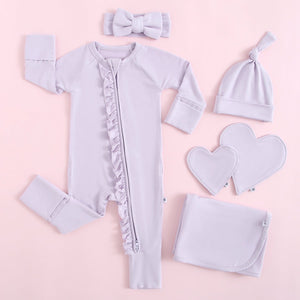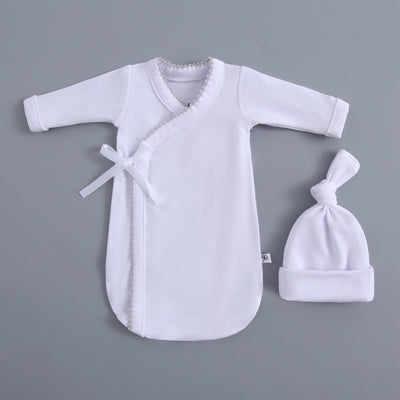
Why Your Birth Experience Matters
Share
Grieving the Birth Experience You Imagined: Why Your Birth Experience Matters
When you think about giving birth, you probably picture a certain experience. Maybe it includes a calm room, loving support, and everything running smoothly. But what happens when the birth doesn’t go as planned? No matter the process, every birth experience matters - it is deeply personal, emotional, and can shape how you see yourself and your baby. It is not just about the outcome, it is also about how you felt, what you went through, and whether or not you felt heard and supported.
The Expectations We Carry
Before giving birth, many parents build up a vision of what labor and delivery will look like. This may be shaped by stories from friends, movies, social media, or childbirth classes. When those expectations are unmet, it can feel like a loss. It’s okay to grieve the birth you hoped for, even if your baby is healthy.
Why Grief After Birth is Normal
Feeling grief after childbirth is more common than people often talk about. To be clear, this grief doesn’t mean you are not thankful for your baby. It simply means your heart needs time to process a tough or unexpected experience. You may be grieving the loss of control, the loss of a certain moment, or the feeling that something was taken from you.
Signs You Might Be Grieving Your Birth Experience
Grief can look different for everyone, but here are some signs you may be mourning your birth experience:
- Feeling sad or tearful when thinking about the birth
- Avoiding conversations about your delivery
- Feeling guilty or ashamed about how things went
- Having trouble bonding with your baby
- Nightmares or flashbacks of the birth
These feelings are real and valid. You are not alone in them.
Birth Trauma is Real
In some cases, grief over a birth can be a sign of birth trauma. This can happen if you felt unsafe, powerless, or unheard during delivery. According to the organization Postpartum Support International, about 9% of women experience post-traumatic stress disorder (PTSD) after childbirth. This is a serious mental health issue that deserves attention and support (Postpartum Support International).
What Makes Birth Experiences So Impactful?
Birth is a major life event. It’s not just physical, but also emotional, spiritual, and even social. How you are treated, what choices you were allowed to make, and how respected you felt during delivery can affect your confidence as a parent and your connection with your baby. Some factors that shape your experience include:
- The level of support from medical staff or your birth partner
- Whether your wishes were respected or ignored
- How much pain you experienced and how it was managed
- Any medical emergencies that happened during labor
Having a Baby in the NICU
If your baby needed to go to the Neonatal Intensive Care Unit (NICU), your birth experience may have felt even more overwhelming. The NICU can be a place of hope and healing, but also of fear and grief. It can be incredibly hard to watch your newborn be connected to machines or be unable to hold them right away. Parents of NICU babies may experience:
- Feelings of helplessness or guilt
- Anxiety over their baby’s health and future
- Disconnection from their baby or the parenting role
- Difficulty celebrating the birth due to fear or trauma
These emotions are valid, and it's okay to mourn the moments you missed. Support and counseling can help you process and heal from the NICU experience.
You're Not Alone
Many parents silently struggle with feelings about their birth. Acknowledging those feelings doesn’t make you a bad parent—it makes you an honest one. You are allowed to feel both grateful and sad. One doesn’t cancel out the other.
According to the Birth Trauma Association, listening to and validating parents’ stories helps them recover more fully (Birth Trauma Association). You deserve that support.
Looking Ahead with Compassion
Healing takes time. Some days will feel easier than others. With the right support and space to process your emotions, you can move forward while honoring what you went through. Your story matters. Your feelings matter. And your birth experience matters—because you matter.
Let yourself grieve the birth you imagined. And remember, healing doesn’t mean forgetting. It means finding peace and strength in your journey.





































